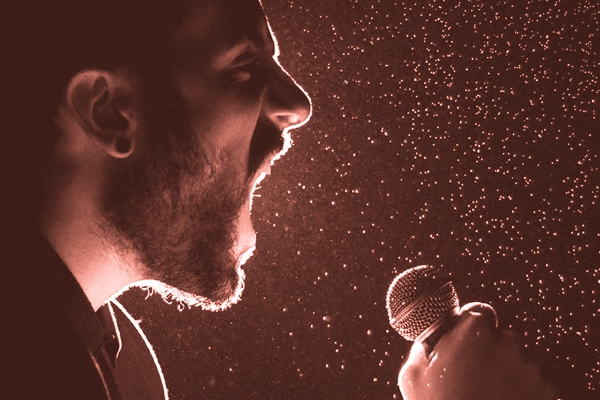 A new play in Toronto raises tempers, a lot of questions, and the bar on audience participation
A new play in Toronto raises tempers, a lot of questions, and the bar on audience participation
Full disclosure: I heard about THE ASSEMBLY: EPISODE 1 (on stage at The Streetcar Crowsnest) from my friend Shayne, a participant in the project around which tonight’s production was created. When I read this description “…a thrilling theatrical response to the rise of extremism and tribalism in political discourse today. This documentary play invites the left and the right to face each other in a live setting and to attempt to transcend their ideological labels through listening”, I knew I had to see it.
I’m glad I did. While indeed thrilling, I also found in THE ASSEMBLY: EPISODE 1 a funny, thought-provoking event that blended strong opinions, humour, and emotions with imagination and tactility.
It feels strange talking about the performances and characters, because they’re based on real people–whose actual words are the dialogue. That said, the actors brought the participants from various points on the political spectrum to stunning life.
Tanja Jacobs was a show-stopper as Valerie, the boisterous “alt-right” member of the group. Though she took issue with being referred to as “alt-right”, she certainly took pride in embodying the sort of anti-immigrant, Islamophobic, close-minded, intellectually dishonest, pearl-clutching white person stereotypically representative of that movement. Her performance was both hilarious and enraging.
Slightly adjacent to her was “James” (Sean Colby), the soft-spoken, barely legal 21-year old “conservative” who is a member of some–allegedly–racist group on his campus (though I don’t recall much detail about that).
Next we have Hope (Ngozi Paul), a super polite Jamaican woman who has recently discovered she is “quite liberal”. She’s the only obvious Person of Colour in the group, and I was disappointed that the only Black woman and immigrant had so little to say. To me, she (and to some extent “James”) seemed more concerned with getting along with everyone.
And that’s not a criticism of Hope, but rather the artists who “curated” this particular group. Almost totally lacking was any clue as to how they chose the participants, and I’d love to know more about the process, even if just a blurb in the programme. Why mostly white people? Why no Indigenous participants?
Finally we have Shayne (captured by Jimmy Blais). What’s a passionate self-identified “Queer, Jewish anarchist” to do in such a mix? It became obvious pretty quickly that this was basically “The Valerie vs. Shayne Show”, as most of the tension arose between the two of them. They seemed to be the only two with firm beliefs and fires in their bellies.
Also featured were Brett Watson and Alex Ivanovici, as themselves, doing duty as moderators and guides.
The staging was fantastic. The creative use of cameras and overhead screens meant we could catch every nuance and eye roll, do rewinds, and even see some live footage from actual participants (which I would have loved to see more of).
As for the show itself? It had several components: the discussion, the “interview/letter” portion with a Trump supporter, and the audience participation. I could literally talk about it for hours, because it raises a lot of questions. Should those on “the left” be more tolerant of those on “the right”, of those with racist views? Is the time for dialogue over? If so, then what?
In a way it feels like a gross display of privilege (and another public setting for bigots to spew hate): a theatre full of (mostly white) comfortable North Americans, paying to watch discourse unfold, maybe even having our own discourses afterwards over the charcuterie board, but in reality (many of us) being so far removed from the horrific realities of war, immigration policies and our genocidal history, and the rise of neo-nazism.
In another way it feels so important, because, ultimately we come to see the slow and gradual changing of one racist person’s mind, even though the amount of work needed to achieve that tiny bit of change is obscene. To me it was powerful as it reminded me of my own ongoing journey and commitment to unlearning white supremacy. I saw my former self, and the tireless efforts of patient people who cared enough to educate me.
My absolute favourite portion was the audience participation. Describing it feels like a spoiler, but I will say this: It was wholly unique, gutsy, and no one was directly asked to participate. From that portion emerged vulnerability (thanks Jimmy Blais), some fantastic questions about representation, and a lot of laughs. I’d love to see how/if this portion is incorporated into future productions.
My only major beef was the strobe-light effect during transitions. It was blinding, jarring, and in my opinion totally unnecessary.
There is SO much more I want to say. There is so much my companion Yossie–who also loved this experience–and I discussed afterwards. I’ve never felt so connected to an audience. If you feel misunderstood, angry, fearful, then I’d highly recommend THE ASSEMBLY: EPISODE 1. It didn’t give me any easy answers to difficult questions, but it sure raised some.
Details
-
- THE ASSEMBLY: EPISODE 1 is playing until November 3, 2018 at The Streetcar Crowsnest (345 Carlaw Ave.)
- Shows run Monday to Saturday at 8:30PM, with an additional matinee on Saturday at 2:30PM
- Ticket prices range from $25-$50 and are available online
- This performance has a periodic strobe-light effect
Photo provided by the company
